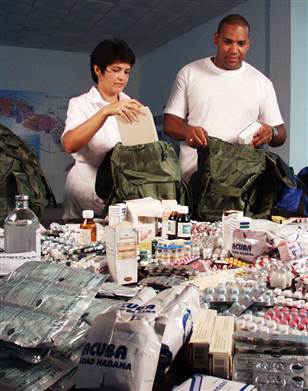Katrina aid from Cuba? No thanks, says U.S.
NBC News | Wednesday, 14 September 2005 | Click here for original article

Although it is unlikely they will be going anywhere, Havana doctors Luis Sauchay and Delvis Marta Fernandez prepare their knapsacks of emergency medical supplies for Katrina victims.
Though relatively young at 34, Sauchay has chalked up more than a decade of practicing hardship medicine.
Right out of medical school, he spent two years on the high seas, the only doctor for hundreds of fishermen aboard an industrial vessel.
During two other years, he cared for the sick and forgotten in an understaffed African clinic, treating countless cases of tuberculosis and cholera.
For the last five years, he has been the local family doctor for 200 working-class families in Havana’s Párraga neighborhood.
And after last December’s tsunami, Sauchay joined a Cuban medical brigade to comfort the shell-shocked in Sri Lanka.
So it was no surprise when just a day after Katrina decimated the Gulf Goast that Sauchay volunteered to help victims even though it means leaving his wife alone with their 2-month-old son.
“I can do a lot of good there,” he stressed, “because I have years of experience dealing with this type of catastrophe.”
Sauchay, though, may never get the chance to prove his worth. Despite Bush administration assurances that international aid offers will be kept free of politics, Cold War tensions seem to be freezing out help from Cuba.
Thanks, but no thanks
In separate Washington press briefings, both the White House and State Department spokesmen this week downplayed the Cuban government’s offer to send some 1,600 medics, field hospitals and 83 tons of medical supplies to ease the humanitarian disaster.
State Department spokesman Sean McCormack asserted last week that the Cuban medical brigade would probably not be needed since there has been a “robust response from the American medical community.”
White House spokesman Scott McClellan scorned the Cuban proposal last Thursday when asked if the president would consider accepting the Cuban help.
“When it comes to Cuba,” said McClellan, “we have one message for Fidel Castro: He needs to offer the people of Cuba their freedom.”
Sauchay and the other Cuban physicians don’t seem to be taking the hint their services may not be wanted.
Still ready if needed
They remain on stand-by, their bags packed. And while they wait at a Havana medical school that normally houses international scholarship students, the brigade has been brushing up on English skills, the epidemiology common to natural disasters, and the local history of Louisiana and Mississippi.
A colleague of Dr. Suchay, Dr. Delvis Marta Fernandez, 32, is frustrated that she and the other doctors find themselves lingering in Havana.
“Let’s get going,” she said. “This is not political. This is a humanitarian emergency. People are dying and they need our help.”
That’s something she knows about, despite her young age.
After graduating medical school shortly after her 22nd birthday, Fernandez spent two years in an isolated mountain community. “I once had to walk some 10 miles for an ambulance,” she said.
From there, she volunteered to work in Haiti where she “practiced medicine by candlelight” for two more years.
And when Hurricane Jeanne killed 600 people in Haiti last September, Fernandez sacrificed her vacation at the beach to return to the flooded island.
“I do this for the children,” she said, expecting that she would be in the U.S. for about three months.
Disaster zone experience
Young, smart, committed and impatient to “get going” are ways to describe this Cuban medical brigade; they also know how to tackle disaster zones — since 1995, more than a dozen hurricanes have hit Cuba.
Still, the Administration has yet to give the Cuban government a flat yes or no. In fact, Havana never may get an answer.






